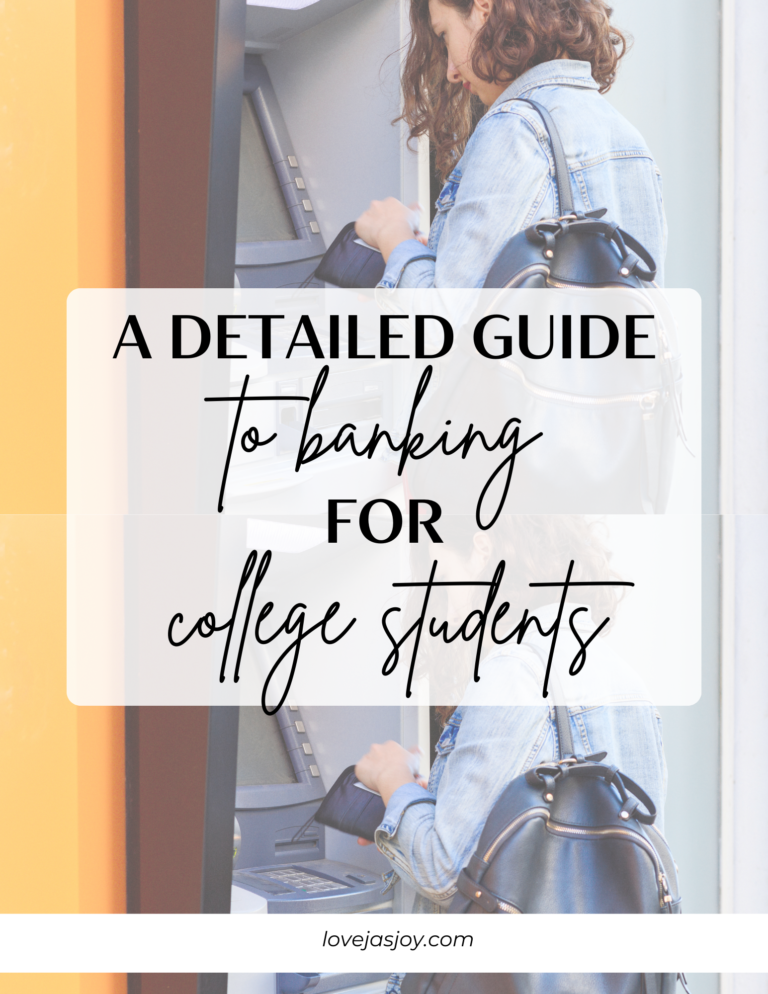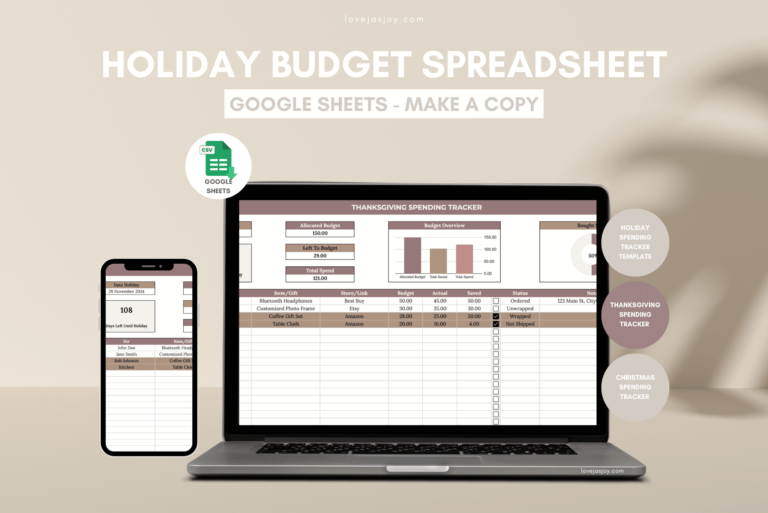A Detailed Guide to Banking for College Students

Disclaimer
Please note that this blog post may contain affiliate links to products or services from third-party websites. The information provided in this blog post is based our own personal experiences, research, and opinions. By reading this blog post, you acknowledge and agree to the terms of this disclaimer. Read our full disclaimer page. If you have any concerns or questions, please feel free to contact us.
In this article, we will be covering a bunch of subtopics for banking! This detailed guide to banking as a college student will help you understand why banking matters, the basics of banking, choosing the right bank for yourself, how to open a bank account step-by-step, and how you can protect yourself from fraud!
Definitely well detailed to help you to the best of our ability!
WITH THAT SAID, HERE IS A DETAILED GUIDE TO BANKING FOR COLLEGE STUDENTS!
Table of Contents
For which of you, desiring to build a tower, does not first sit down and count the cost, whether he has enough to complete it? Otherwise, when he has laid a foundation and is not able to finish, all who see it begin to mock him, saying, ‘This man began to build and was not able to finish.’
Luke 14:28-30 Tweet
Join our "Love money Scoops" group!
Join us in achieving financial stability! Receive a wealth of practical tips, budgeting hacks, investment insights, and strategies to achieve your financial goals!
Why Banking Matters for College Students
Why Banking Matters: Safe Money Storage
Safe Money Storage
Why Banking Matters: Easy Access
Easy Access
With a bank account, you can access your money conveniently. Most banks offer online and mobile banking, allowing you to check balances, pay bills, and transfer funds from the comfort of your own dorm room or home! You can also set up direct deposit from your employer to your bank account, preferable over paper checks.
Why Banking Matters: Budgeting Tools
Budgeting Tools
Many banks provide budgeting tools, calculators and apps that can help you track your spending and learn more about money management. This can be invaluable for college students learning to manage their finances independently!
Budgeting tools have helped me to gain more information on where my funds are going and to be more financially responsible.
Why Banking Matters: Debit Cards
Debit Cards
Most student bank accounts come with a debit card. Debit cards are a safe and convenient way to make purchases and pay bills without carrying cash. It is important to be vigilant and take important measures to protect your account. Refer to “How to Protect Your Accounts from Fraud” section in this article.
Why Banking Matters: Building Credit
Building Credit
Establishing a banking history is the first step to building a credit history. Responsible use of a bank account can set the stage for future credit opportunities. This is important if you are looking to apply for any type of loan or line of credit in the future, such as vehicle, mortgage, personal, credit card, CLOC, and debt consolidation.
Why Banking Matters: Financial Aid and Loans
Financial Aid and Loans
If you receive financial aid, loan reimbursement, or student loans, a bank account is typically required for disbursements. Having a bank account ensures you receive these funds on time and you have statements you can refer to for tax and budgeting purposes.
Why Banking Matters: Financial Independence
Financial Independence
College is a time of transition into adulthood. Learning to manage your own bank account gives you a sense of financial independence and responsibility.
Why Banking Matters: Emergencies and Savings
Emergencies and Savings
Having a bank account allows you to save money for emergencies or future goals. It’s a smart way to start building a financial safety net, allocate funds to proper accounts (e.g., bill account, spendings, sinking fund), and accrue higher dividends in a saving than you would in a checking.
Why Banking Matters: Fraud Protection
Fraud Protection
Banks offer security measures to protect your account from fraud and unauthorized transactions, giving you peace of mind! If anything occurs, they will notify you immediately and credit your account if necessary.
Why Banking Matters: Money Management Skills
Money Management Skills
Lastly, having a bank account provides an opportunity to develop essential money management skills! It is important to build your financial literacy and skills now to establish good financial habits. You can learn how to budget, save, and make financial decisions that will benefit you throughout your life.

Essential Money Management Strategies
These money management strategies are essential in your long-term financial success! Set long-term financial goals, diversify your income and more!
Banking Basics: Navigating Your Financial Options
Banking Basics: Checking Account
Checking Account
A checking account is your primary transactional account. It allows you to deposit and withdraw money, write checks, and use a debit card for everyday purchases. Most checking accounts are designed for easy access to your funds. You can have multiple with different purposes such as a bills account (e.g., rent, car, phone) and spending account (e.g., gas, groceries, personal).
Banking Basics: Savings Account
Savings Account
A savings account is for, well, saving! It offers a safe place to keep money while earning interest. You can passively accrue higher dividends than a checking account would, while saving up for your future goals (e.g., wedding, travel, school) or growing your emergency funds. It’s crucial to choose an account with competitive interest rates.
Banking Basics: Money Market Accounts
Money Market Accounts
Money market accounts are like savings accounts, but they usually offer higher interest rates. They may require a higher minimum balance and have limited transactions. For instance, a money market may require a $2500 minimum balance to start accruing their higher dividend of 1%. Rate may increase as your balance increases. These are great for growing your savings more quickly.
Banking Basics: Certificate of Deposits (CDs)
Certificate of Deposits (CDs)
CDs are time deposits that offer higher interest rates than regular savings accounts. The catch is, you agree not to touch your money for a set period, which can range from a few months to several years. The benefit is the rates are significantly higher than any other bank account. A regular savings account may have an APY of 0.25%, money market an APY of 1.3%, but a CD could have a higher rate of 5.30. Significantly higher and better if you don’t plan on utilizing the funds in the near future.
Banking Basics: Consumer Loans
Consumer Loans
Banks offer various loans, such as personal loans, auto loans, and student loans. These provide funds for specific purposes and must be repaid with interest. Interest rates, types of loans available, and eligibility for the loan varies per bank.
Banking Basics: Credit Cards
Credit Cards
Credit cards are revolving credit, which means it allows you to continue making purchases within your credit limit, pay it back and utilize the funds again. They’re convenient but should be used responsibly to avoid high-interest debt. A rule of thumb is to use it for emergencies and only spend what you know you can pay back within the bill cycle (to prevent being charged interest).
Banking Basics: Fees
Fees
Be aware of common fees like overdraft fees (charged when you spend more than you have), late fees (for missed payments), and protection fees (for services like overdraft protection). Some accounts offer fee waivers or discounts.

how to make money as a busy college student
These strategies on how you can make money as a college student, are realistic and achievable! There are more opportunities outside a part-time job.
Choosing the Right Bank for College Students
Choosing the Right Bank: Research and Selection
Research and Selection
Take your time to research and choose a bank that aligns with your needs. Look for banks that offer student-friendly services and have a strong reputation for customer service. You do not want to have an online banking service as your primary bank, you will want to open an account at a physical bank. If you are attending a school that is far from home, search for a bank.
Choosing the Right Bank: What to Look For
What to Look For
When selecting a bank, consider factors such as low or no monthly fees, ATM accessibility on or near campus, a user-friendly mobile app for convenient banking, and a range of financial products suitable for students.
Choosing the Right Bank: Local Banks vs. Online Banks
Local Banks vs. Online Banks
You’ll find both local brick-and-mortar banks and online banks catering to students. Local banks provide in-person services, while online banks often offer higher interest rates and lower fees due to lower overhead costs. Some find that local banks are more beneficial because it is easily accessible, while others prefer online banks. Most banks have online banking available, conduct your own research to decide which best suits your lifestyle and preferences.
Choosing the Right Bank: Benefits of Student Checking Accounts
Benefits of Student Checking Accounts
Many banks offer special student checking accounts that best meet the unique financial needs of college students. These accounts more than often provide benefits like no monthly fees, no minimum balance requirements, and free ATM withdrawals at the bank’s network of ATMs. Conduct your own in-depth research on the local or online banks that you find the most appealing.
Opening a Bank Account: A Step-by-Step Guide
Opening a Bank Account Step #1: Choose a Bank
Choose a Bank
Opening a Bank Account Step #2: Gather Required Documents
Gather Required Documents
To open an account, you will need to provide certain documents. These may include your government-issued ID (like a driver’s license or passport), Social Security number, proof of address (like a utility bill or lease agreement), and your initial deposit. Required documents vary by bank.
Opening a Bank Account Step #3: Visit the Bank
Visit the Bank
Once you’ve chosen a bank and gathered the necessary documents and funds, visit the bank branch, or fill out the application online if available. A bank representative will guide you through the account-opening process.
Opening a Bank Account Step #4: Choose the Right Account(s)
Choose the Right Account(s)
Ask about account options tailored to students. Many banks offer specialized student checking accounts with features like no monthly fees, free ATM withdrawals, and online banking services.
Opening a Bank Account Step #5: Review the Account Agreement and Required Disclosures
Review the Account Agreement and Required Disclosures
Before finalizing your account, carefully review the account agreement and disclosures. Pay attention to details like fees, minimum balance requirements, and the bank’s policies. This important information can easily be missed, ask the representative who is helping you to go over the agreement and disclosures if needed.
Opening a Bank Account Step #6: Set Up Online Banking
Set Up Online Banking
Take advantage of online banking services, which allow you to manage your account, pay bills, and monitor transactions conveniently from your computer or mobile device. Online banking is important for recognizing any frauds or disputes on your account and for convenience.
Opening a Bank Account Step #7: Protect Your Information
Protect Your Information
Be vigilant about safeguarding your account information! Thousands of fraudulent activities occur, most due to the owner’s poor account handling.
It is important to not give your PIN to anyone, protect your account with 2 step authentication and to not save your online banking login credentials on public computers.
Keep your debit card and checks secure to prevent unauthorized access as well.
It is important to take all the necessary steps to protect yourself.
Safeguarding Your Financial Well-being: Online Security and Fraud Protection
Security and Protection: Bank Account & Personal Information
Protecting Your Bank Account and Personal Information
Keep your bank account and personal details safe by following these essential practices.
First, create strong, unique passwords for your online banking accounts and change them regularly.
- A good method to use is mnemonics. For example, i Have 3 Beautiful Cats in My apartment! This saying can be turned into: iH3BCnMa!
Second, avoid sharing sensitive information like your PIN or account number through email or text messages.
Third, routinely review your debit and credit card statements for any unauthorized transactions.
Fourth, review your credit reports from all CBR (e.g., TransUnion, Experian, Equifax) to identify any information that may be false.
Last but not least, be cautious when using public Wi-Fi for financial transactions, as it can be less secure.
Security and Protection: Identifying Common Online Banking Scams
Identifying Common Online Banking Scams
Stay vigilant for common online banking scams, such as phishing emails or fake websites. Scammers often pose as legitimate institutions to trick you into revealing your personal and financial information! It is important to be extra cautious when clicking on links or downloading attachments from unfamiliar sources. Always verify the legitimacy of any website or email requesting your data. If you do not know the sender, do not click anything.
Security and Protection: Steps to Take If You Suspect Fraud or Identity Theft
Steps to Take If You Suspect Fraud or Identity Theft
If you suspect fraud or identity theft, act swiftly to minimize potential damage.
- Freeze your accounts, if necessary, to prevent further unauthorized access.
- Contact your bank immediately to report any unauthorized transactions.
- File a report with the police and report the incident to the Federal Trade Commission (FTC) through their website.
Incorporating these practices into your online banking routine can help protect your financial well-being. Being proactive and vigilant is the best defense against online threats. Remember, online security is an ongoing commitment to safeguard your financial future.
Read more about how you can Protect Yourself From Online Scams and Attacks.
Here are Five Things to Do to Protect Yourself Online.
Learn more about Identity Theft: What It is, How to Prevent It and More.
Learn more about Identity Theft on USA.gov
Banking is a vital component in any and every person’s financial journey. It’s not just a place to store money; it’s a tool for managing finances, building credit, and gaining the skills needed for a financially secure future.
This detailed guide to banking has everything you need to get started! We broke down why banking matters, the basics of banking, how to choose the right bank for yourself, provided a step-by-step guide to opening a bank account, and how you can protect yourself from fraud.
Aside from opening a bank account, it is important to take control of your finances by learning How to Budget, Save Money in College, Manage Your Money Wisely and increase your financial literacy by reading The Best Money Books.
There is so much more that we have in store to help you in your financial journey! Stay updated by joining our email list 🙂 Until next time!
love, Jas Joy
Other Posts You May Like
Related Topics


A Payday Routine: How to Budget Your Paycheck Like a Financial Expert



